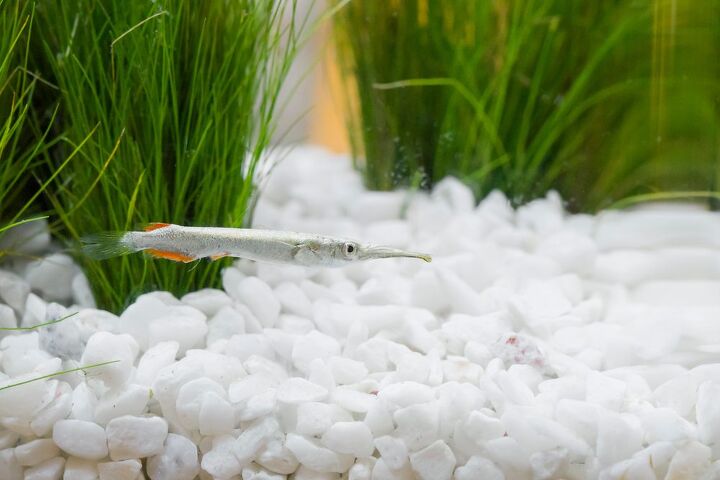Halfbeak


About Halfbeak
Halfbeaks are a type of marine and brackish water fish belonging to the family Hemiramphidae. These fish are found throughout the world, primarily in warm waters where they tend to inhabit the epipelagic (upper) region of the water. The Halfbeak is known for their unique jaw configuration – the lower is significantly longer than the upper. There are numerous species of halfbeak, but most of the brackish species are peaceful community fish.
Halfbeaks are a type of marine and brackish water fish belonging to the family Hemiramphidae.
The brackish species of halfbeaks are primarily found in the warm water estuaries of Asia, though some can be found in limited freshwater environments.
Freshwater and brackish water halfbeak fish are a little less colorful than some marine species. These fish tend to be silver, gray, tan, or brown in coloration, sometimes with red coloring on the fins.
Brackish and freshwater halfbeaks should be kept in community tanks with other peaceful fish of similar size, especially other halfbeaks. These fish prefer warmer waters in the 75°F to 79°F temperature range with a pH around 6.8 to 7.5 and a water hardness level between 8 and 12 KH. Halfbeaks tend to inhabit the upper levels of the water column and they prefer planted tanks decorated with rocks, caves, and pieces of driftwood. These fish do have a tendency to jump so they need to be kept in a tank with a tight lid. Because these fish require brackish tank conditions they are a little tricky to care for.
Freshwater and brackish water halfbeak fish are a little less colorful than some marine species.
Halfbeaks are generally carnivorous fish by nature, feeding on various insects, crustaceans, and smaller fishes. In the home aquarium, these fish should be fed commercial pellets, flakes, or granules designed for carnivorous fish. They should also be offers fresh and frozen foods including tubifex worms, bloodworms, brine shrimp, and more.
Also read: Fast-Growing Aquarium Plants for Planted Tanks
All halfbeaks are egg-layers and external fertilizers – this simply means that the female lays her eggs before the male fertilizes them. These fish lay relatively large eggs for their size and they tend to spawn over plants. Some halfbeak species prefer to breed in shallow waters so you may need a separate breeding tank if you want them to spawn.
Though most halfbeaks are marine species, several can be found in brackish or freshwater environments including the Celebes Halfbeak, the Wrestling Halfbeak, and the Bearded Halfbeak.
Photo credit: Siwakorn Nuamnual/Shutterstock; David Tadevosian/Shutterstock

Kate Barrington is the loving owner of two cats (Bagel and Munchkin) and a noisy herd of guinea pigs. Having grown up with golden retrievers, Kate has a great deal of experience with dogs but labels herself a lover of all pets. Having received a Bachelor's degree in English, Kate has combined her love for pets and her passion for writing to create her own freelance writing business, specializing in the pet niche.
More by Kate Barrington
























